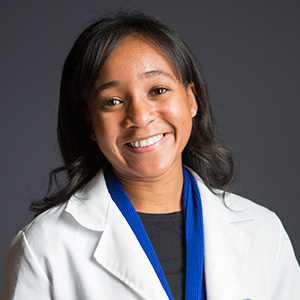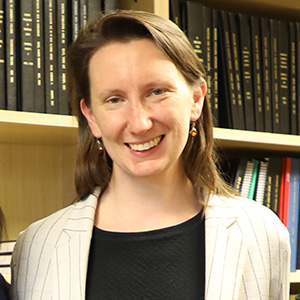
Meet the Post-Docs
Three new post-doctoral fellows begin their work this month.
For the next year, these newly minted PhDs will continue their original investigations with faculty mentors, presenting and publishing and seeking grant funding, with the ultimate aim of becoming tenure-track faculty members. Meet them.
Oxytocin in the form of Pitocin has been used since the 1960s to induce labor in pregnant women and has become increasingly ubiquitous in the delivery room: In 1990, about one in 10 women were administered “pit” but by 2021, one in three were. Nearly 100% of women receive it in some dose to prevent postpartum hemorrhage. In her research, family nurse practitioner Maria McDonald (PhD ’23) is investigating whether there are epigenetic risks associated with administering this synthetic hormone that may predispose moms and babies to develop depression long-term.
[VIDEO] Dark Passage: How Oxytocin Influences Depression's Development
For her dissertation, McDonald examined the impact varying levels of synthetic oxytocin had on how mothers’ mood and behavior genes chemically express through DNA methylation. Using pregnant prairie voles—creatures with social-behavioral parenting and caregiving traits similar to humans’—she examined epigenetic shifts in vole moms’ and pups’ brain and blood tissue when giving them varying doses of oxytocin.
Over the next year as a post-doctoral fellow, she’ll continue this work with human data to explore how high doses of oxytocin increase methylation of the gene associated with mood and behavior.
---
Though she’d initially planned to become a labor and delivery nurse or midwife, Victoria Petermann found she loved working with gynecological oncology patients, many of whom came from rural areas. She also saw some of the problems they faced: lengthy travel distances to and from cancer care and treatment, lean finances, and sometimes anemic social support, which sometimes meant their cancers were more advanced and complicated. She also discovered that “rural” wasn’t a blanket term but an expansive one requiring thoughtful consideration from providers and policymakers tasked with improving these special patients' outcomes.
"I want to look at rural areas at a granular level, considering healthcare services, and understand the socio-economic environment that people are living in."
Victoria Petermann, PhD, RN
For her post-doctoral work, Petermann will expand upon her dissertation work to study why rural patients with gynecological cancers like endometrial cancer (EC)—which impacts about 66,000 people a year, and results in more than 12,500 deaths each year—often don’t fare as well as their more urban peers. By analyzing their geographic and built environment alongside treatment and outcomes by ZIP code and county, she’ll also conduct qualitative interviews with rural EC patients to determine whether unmet social needs impact their well-being, and what factors most help to improve their odds of surviving and thriving during and after treatment.
---
Crystal Chu, PhD, RN
A former oncology nurse studying the impact of a decision tool for women seeking contralateral prophylactic mastectomy
A growing number of women diagnosed with cancer in a single breast opt to have both breasts removed; oncology nurse Crystal Chu (PhD ’23) saw it all the time. But these patients who opt for contralateral prophylactic mastectomy (CPM) often face a more difficult treatment pathway than expected, given the increased risks for infection, complications, and longer healing time, which can lead to depression, body image problems, and decisional regret.
[VIDEO] No Regrets: A Decision-Making Tool for Women Considering CPMs
To help patients considering CPM understand its risks, Chu created, deployed, and tested a novel decision-making tool that offered a balance sheet-style checklist, based on the validated methodology of the DecisionKEYs protocol. Phase one of Chu’s research found the tool was success for patients considering CPMs; in phase two of her research, Chu will create a decision-making tool series for breast cancer patients across the clinical spectrum that will explore risk tolerance, clinical versus economic decision making, and decisional conflict.



